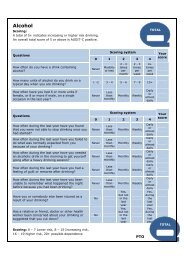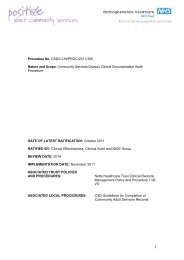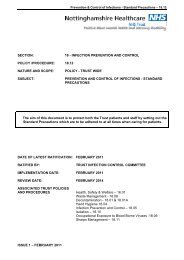Consent to Examination or Treatment Policy - Nottinghamshire ...
Consent to Examination or Treatment Policy - Nottinghamshire ...
Consent to Examination or Treatment Policy - Nottinghamshire ...
You also want an ePaper? Increase the reach of your titles
YUMPU automatically turns print PDFs into web optimized ePapers that Google loves.
<strong>Consent</strong> <strong>to</strong> <strong>Examination</strong> <strong>or</strong> <strong>Treatment</strong> – 1.03<br />
Guidance <strong>to</strong> health professionals (<strong>to</strong> be read in conjunction with consent policy)<br />
This f<strong>or</strong>m<br />
This f<strong>or</strong>m documents the patient’s agreement (<strong>or</strong> that of a person with parental responsibility f<strong>or</strong> the<br />
patient) <strong>to</strong> go ahead with the investigation <strong>or</strong> treatment you have proposed. It is only designed f<strong>or</strong><br />
procedures where the patient is expected <strong>to</strong> remain alert throughout and where an<br />
anaesthetist is not involved in their care: f<strong>or</strong> example f<strong>or</strong> drug therapy where written consent<br />
is deemed appropriate. In other circumstances you should use either f<strong>or</strong>m 1 (f<strong>or</strong> adults/competent<br />
children) <strong>or</strong> f<strong>or</strong>m 2 (parental consent f<strong>or</strong> children/young people) as appropriate.<br />
<strong>Consent</strong> f<strong>or</strong>ms are not legal waivers – if patients, f<strong>or</strong> example, do not receive enough inf<strong>or</strong>mation on<br />
which <strong>to</strong> base their decision, then the consent may not be valid, even though the f<strong>or</strong>m has been<br />
signed. Patients also have every right <strong>to</strong> change their mind after signing the f<strong>or</strong>m.<br />
Who can give consent<br />
Everyone aged 16 <strong>or</strong> m<strong>or</strong>e is presumed <strong>to</strong> be competent <strong>to</strong> give consent f<strong>or</strong> themselves, unless the<br />
opposite is demonstrated. If a child under the age of 16 has “sufficient understanding and<br />
intelligence <strong>to</strong> enable him <strong>or</strong> her <strong>to</strong> understand fully what is proposed”, then he <strong>or</strong> she will be<br />
competent <strong>to</strong> give consent f<strong>or</strong> himself <strong>or</strong> herself. Young people aged 16 and 17, and legally<br />
‘competent’ younger children, may theref<strong>or</strong>e sign this f<strong>or</strong>m f<strong>or</strong> themselves, if they wish. If the child<br />
is not able <strong>to</strong> give consent f<strong>or</strong> himself <strong>or</strong> herself, some-one with parental responsibility may do so on<br />
their behalf. Even where a child is able <strong>to</strong> give consent f<strong>or</strong> himself <strong>or</strong> herself, you should always<br />
involve those with parental responsibility in the child’s care, unless the child specifically asks you not<br />
<strong>to</strong> do so. If a patient is mentally competent <strong>to</strong> give consent but is physically unable <strong>to</strong> sign a f<strong>or</strong>m,<br />
you should complete this f<strong>or</strong>m as usual, and ask an independent witness <strong>to</strong> confirm that the patient<br />
has given consent <strong>or</strong>ally <strong>or</strong> non-verbally.<br />
When NOT <strong>to</strong> use this f<strong>or</strong>m (see also ‘This f<strong>or</strong>m’ above)<br />
If the patient is 18 <strong>or</strong> over and is not legally competent <strong>to</strong> give consent, you should use f<strong>or</strong>m 4 (f<strong>or</strong>m<br />
f<strong>or</strong> adults who are unable <strong>to</strong> consent <strong>to</strong> investigation <strong>or</strong> treatment) instead of this f<strong>or</strong>m. A patient will<br />
not be legally competent <strong>to</strong> give consent if:<br />
• they are unable <strong>to</strong> comprehend and retain inf<strong>or</strong>mation material <strong>to</strong> the decision and/<strong>or</strong><br />
• they are unable <strong>to</strong> weigh and use this inf<strong>or</strong>mation in coming <strong>to</strong> a decision.<br />
You should always take all reasonable steps (f<strong>or</strong> example involving m<strong>or</strong>e specialist colleagues) <strong>to</strong><br />
supp<strong>or</strong>t a patient in making their own decision, bef<strong>or</strong>e concluding that they are unable <strong>to</strong> do so.<br />
Relatives cannot be asked <strong>to</strong> sign this f<strong>or</strong>m on behalf of an adult who is not legally competent <strong>to</strong><br />
consent f<strong>or</strong> himself <strong>or</strong> herself.<br />
Inf<strong>or</strong>mation<br />
Inf<strong>or</strong>mation about what the treatment will involve, its benefits and risks (including side-effects and<br />
complications) and the alternatives <strong>to</strong> the particular procedure proposed, is crucial f<strong>or</strong> patients when<br />
making up their minds about treatment. The courts have stated that patients should be <strong>to</strong>ld about<br />
‘significant risks which would affect the judgement of a reasonable patient’. ‘Significant’ has not<br />
been legally defined, but the GMC requires doc<strong>to</strong>rs <strong>to</strong> tell patients about ‘serious <strong>or</strong> frequently<br />
occurring’ risks. In addition if patients make clear they have particular concerns about certain kinds<br />
of risk, you should make sure they are inf<strong>or</strong>med about these risks, even if they are very small <strong>or</strong><br />
rare. You should always answer questions honestly. Sometimes, patients may make it clear that<br />
they do not want <strong>to</strong> have any inf<strong>or</strong>mation about the options, but want you <strong>to</strong> decide on their behalf.<br />
In such circumstances, you should do your best <strong>to</strong> ensure that the patient receives at least very<br />
basic inf<strong>or</strong>mation about what is proposed. Where inf<strong>or</strong>mation is refused, you should document this<br />
overleaf <strong>or</strong> in the patient’s notes.<br />
The law on consent<br />
See the Department of Health’s Reference guide <strong>to</strong> consent f<strong>or</strong> examination <strong>or</strong> treatment f<strong>or</strong> a<br />
comprehensive summary of the law on consent (also available at www.doh.gov.uk/consent).<br />
ISSUE 6 – AUGUST 2012 39










